Грег Иган - Distress
Здесь есть возможность читать онлайн «Грег Иган - Distress» весь текст электронной книги совершенно бесплатно (целиком полную версию без сокращений). В некоторых случаях можно слушать аудио, скачать через торрент в формате fb2 и присутствует краткое содержание. Жанр: Фантастика и фэнтези, на английском языке. Описание произведения, (предисловие) а так же отзывы посетителей доступны на портале библиотеки ЛибКат.
- Название:Distress
- Автор:
- Жанр:
- Год:неизвестен
- ISBN:нет данных
- Рейтинг книги:3 / 5. Голосов: 1
-
Избранное:Добавить в избранное
- Отзывы:
-
Ваша оценка:
- 60
- 1
- 2
- 3
- 4
- 5
Distress: краткое содержание, описание и аннотация
Предлагаем к чтению аннотацию, описание, краткое содержание или предисловие (зависит от того, что написал сам автор книги «Distress»). Если вы не нашли необходимую информацию о книге — напишите в комментариях, мы постараемся отыскать её.
Distress — читать онлайн бесплатно полную книгу (весь текст) целиком
Ниже представлен текст книги, разбитый по страницам. Система сохранения места последней прочитанной страницы, позволяет с удобством читать онлайн бесплатно книгу «Distress», без необходимости каждый раз заново искать на чём Вы остановились. Поставьте закладку, и сможете в любой момент перейти на страницу, на которой закончили чтение.
Интервал:
Закладка:
The ultimate test of a TOE was to answer questions like: "What is the probability of a ten-gigaelectronvolt neutrino fired at a stationary proton scattering off a down quark and emerging at a certain angle?"… or even just: "What is the mass of an electron?" Essentially, Mosala prefixed all such questions with the condition: "Given that we know that space-time is roughly four-dimensional, and total space is roughly ten-dimensional, and the apparatus used to perform the experiment consists, approximately, of the following…"
Her supporters said she was merely setting everything in context. No experiment happened in isolation; quantum mechanics had been hammering that point home for the last hundred and twenty years. Asking a Theory of Everything to predict the chance of observing some microscopic event—without adding the proviso that "there is a universe, and it contains, among other things, equipment for detecting the event in question"—would be as nonsensical as asking: "If you pick a marble out of a bag, what are the odds that it will be green?"
Her critics said she used circular reasoning, assuming from the very beginning all the results she was trying to prove. The details she fed into her computations included so much about the known physics of the experimental apparatus that—indirectly, but inevitably—they gave the whole game away.
I was hardly qualified to come down on either side… but it seemed to me that Mosala’s opponents were being hypocritical, because they were pulling the same trick under a different guise: the alternatives they offered all invoked a cosmological fix. They declared that "before" the Big Bang and the creation of time (or "adjoining" the event, to avoid the oxymoron), there had been nothing but a perfectly symmetrical "pre-space," in which all topologies carried equal weight… and the "average result" of most familiar physical quantities would have been infinite. Pre-space was sometimes called "infinitely hot"; it could be thought of as the kind of perfectly balanced chaos which space-time would become if so much energy was poured into it that literally everything became equally possible. Everything and its opposite; the net result was that nothing happened at all.
But some local fluctuation had disturbed the balance in such a way as to give rise to the Big Bang. From that tiny accident, our universe had burst into existence. Once that had happened, the original "infinitely hot," infinitely even-handed mixture of topologies had been forced to become ever more biased, because "temperature" and "energy" now had a meaning—and in an expanding, cooling universe, most of the "hot" old symmetries would have been as unstable as molten metal thrown into a lake. And when they’d cooled, the shapes into which they’d frozen had just happened to favor topologies close to a certain ten-dimensional total space—one which gave rise to particles like quarks and electrons, and forces like gravity and electromagnetism.
By this logic, the only correct way to sum over all the topologies was to incorporate the fact that our universe had—by chance—emerged from pre-space in a certain way. Details of the broken symmetry had to be fed into the equations "by hand"—because there was no reason why they couldn’t have been utterly different. And if the physics resulting from this accident seemed improbably conducive to the formation of stars, planets, and life… then this universe was just one of a vast number which had frozen out of pre-space, each with a different set of particles and forces. If every possible set had been tried, it was hardly surprising that at least one of them had turned out to be favorable to life.
It was the old anthropic principle, the fudge which had saved a thousand cosmologies. And I had no real argument with it even if all the other universes were destined to be forever hypothetical.
But Violet Mosala’s methods seemed neither more nor less circular. Her opponents had to "fine tune" a few parameters in their equations, to take account of the particular universe "our" Big Bang had created. Mosala and her supporters merely described real experiments in the real world so thoroughly that they "showed the equations" the very same thing.
It seemed to me that both groups of physicists were confessing, however reluctantly, that they couldn’t quite explain how the universe was built… without mentioning the fact that they were there inside it, looking for the explanation.
Silence filled the cabin as we flew into darkness. Display screens blinked out, one by one, as passengers dozed off; everyone had had a long journey, wherever they’d started from. I watched the cloud banks behind us darken—a swift, violent sunset, metallic and bruised—then I switched to a route map as we headed northeast, just beyond sight of New Zealand. I thought of space probes on slingshot orbits to Venus via Jupiter. It was as if we’d had to take the long way round to build up enough velocity—as if Stateless was moving too fast to be approached any other way.
An hour later, the island finally appeared ahead of us, like a pale stranded starfish. Six arms sloped gently down from a central plateau; along their sides, gray rock gave way to banks of coral, which thinned from a mass of solid outcrops to a lacelike presence barely breaking the surface of the water. A faint blue bioluminescent glow outlined the convoluted borders of the reefs, enclosed by a succession of other hues—the color-coded depth lines of a living navigation chart. A small cloud of flashing orange fireflies was clustered in the nearest of the starfish’s armpits; whether they were boats anchored in the harbor, or something more exotic, I couldn’t tell.
Inland, a sprinkling of lights hinted at a city’s orderly grid. I felt a sudden rush of unease. Stateless was as beautiful as any atoll, as spectacular as any ocean liner… with none of the reassuring qualities of either. How could I trust this bizarre artifact not to crumble into the sea? I was accustomed to standing on solid rock a billion years old, or riding machines of a suitably modest human scale. In my own lifetime, this whole island had been nothing but a cloud of minerals adrift over half the Pacific—and from this vantage, it didn’t seem beyond belief that the ocean might surge in through a thousand invisible pores and channels to dissolve it all, reclaim it all, at any moment.
As we descended, though, the land spread out around us, streets and buildings came into view, and my insecurity faded. One million people had made this their home, staking their lives on its solidity. If it was humanly possible to keep this mirage afloat, then I had nothing to fear.
10
The plane emptied slowly. Passengers pressed forward, sleepy and irritable; many were clutching cushions and small blankets, looking like children up past their bedtime. It was only about nine p.m. here—and most people’s body clocks would have agreed—but we were all still dazed and cramped and weary. I looked around for Indrani Lee, but I couldn’t spot her in the crowd.
There was a security gate at the end of the umbilical, but no airport staff in sight, and no obvious device for interrogating my passport. Stateless placed no restrictions on immigration, let alone the entry of temporary visitors—but they did prohibit certain imports. Beside the gate was a multilingual sign which read:
FEEL FREE TO TRY TO BRING THROUGH WEAPONS. WE’LL FEEL FREE TO TRY TO DESTROY THEM.
STATELESS AIRPORT SYNDICATE
I hesitated. If my passport wasn’t read, and the seal of approval for my implants taken into account… what would this machine do to me? Incinerate a hundred thousand dollars' worth of hardware—and fry a large part of my digestive tract in the process?
Читать дальшеИнтервал:
Закладка:
Похожие книги на «Distress»
Представляем Вашему вниманию похожие книги на «Distress» списком для выбора. Мы отобрали схожую по названию и смыслу литературу в надежде предоставить читателям больше вариантов отыскать новые, интересные, ещё непрочитанные произведения.
Обсуждение, отзывы о книге «Distress» и просто собственные мнения читателей. Оставьте ваши комментарии, напишите, что Вы думаете о произведении, его смысле или главных героях. Укажите что конкретно понравилось, а что нет, и почему Вы так считаете.
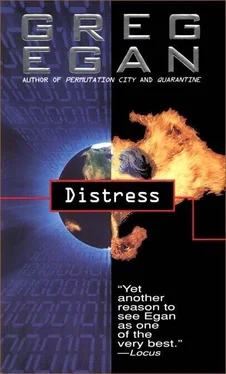

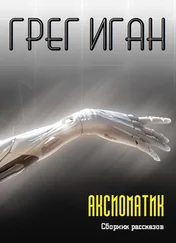
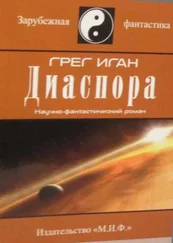
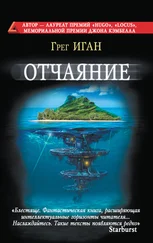
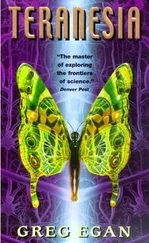
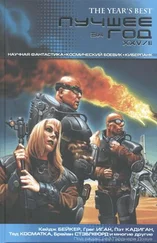

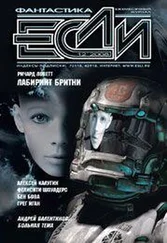
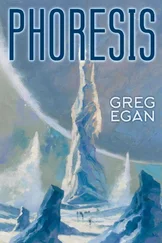
![Грег Иган - Рассказы [компиляция]](/books/419837/greg-igan-rasskazy-kompilyaciya-thumb.webp)
